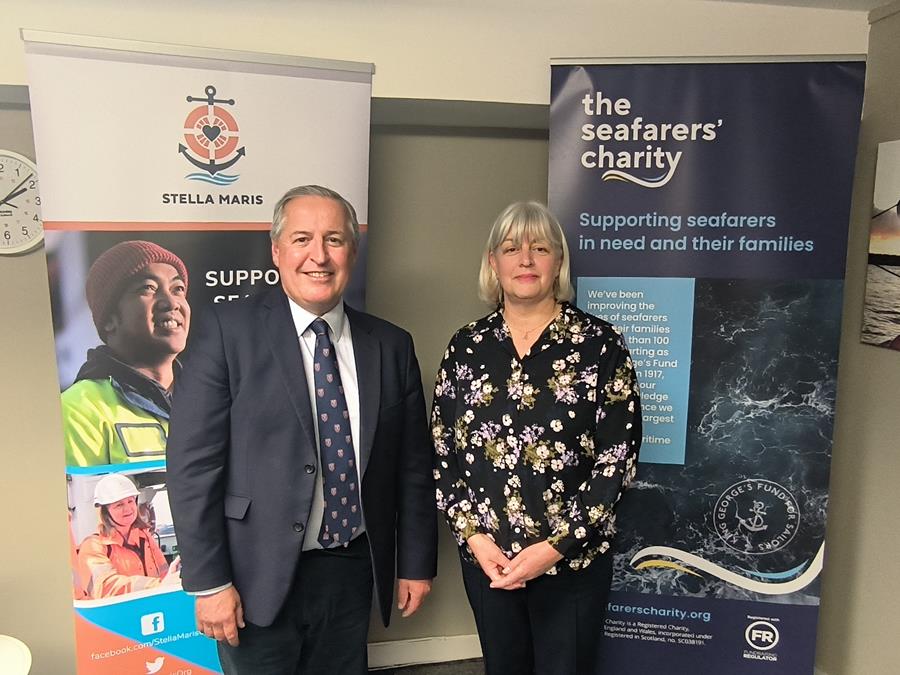Posted on: 12 June 2024
Hundreds of thousands of seafarers and fishers in the UK and other parts of the world have benefited from practical, pastoral and spiritual support provided by global ship visiting network Stella Maris over the past 10 years, thanks to over £1 million in grant funding provided by The Seafarers’ Charity over that period. The Seafarers’ Charity’s sustained grant funding over the last ten years has enabled Stella Maris to help ensure better and safer working lives at sea for seafarers and fishers.
Through its global network of over 200 port chaplains and more than 800 volunteers, Stella Maris is present in 353 ports in 57 countries, and collectively they undertake up to 70,000 ship visits globally each year. The Stella Maris teams provide fishers and seafarers with a listening ear, practical assistance, warm clothing, reading materials, transportation into towns, faith materials, and communication tools for contacting family and friends back home.
Unrestricted core funding provided by The Seafarers’ Charity over the last decade has enabled Stella Maris to continue carrying out vital daily ship visits, offering friendship, advice and timely support to seafarers and fishers faced with challenges whilst working at sea. Some of these challenges have included: abandonment, modern slavery, non-payment of wages, hospitalisation and deaths at sea or back home.
As a recent example, an Indian crew abandoned in Troon, Scotland had not received their wages for several months. The local Stella Maris chaplain, Deacon Joe O’Donnell, visited and provided them with free mobile phone SIM cards, food, clothing and transport into town. The uncertainty of having no income put them under huge mental strain, so Stella Maris offered them pastoral support and reassurance. Following this intervention, the crew were eventually paid and they were able to return home.
Grants from The Seafarers’ Charity have also supported the growth and development of Stella Maris’ activities in South Africa and Kenya during this period. In Kenya, this has enabled the growth of Stella Maris Kenya from one port chaplain and three volunteers to a team of one port chaplain, three staff members, and 30 volunteers, greatly increasing the number of ships visited and seafarers helped. The funding has also helped Stella Maris Kenya to support over 8,000 seafarers, fishers and their families through access to training, educational programmes and counselling support.
Tim Hill MBE, CEO at Stella Maris said: ‘None of our work is possible without that unrestricted core funding provided by The Seafarers’ Charity. Who would pay Deacon Joe’s salary, the fuel for his car, his personal protective equipment? Core funding isn’t glamorous, it’s not aligned to a specific project or deliverable, but here in the UK it is essential to enable my 22 chaplains and 80 volunteers to carry out their duties, so we are very grateful to The Seafarers’ Charity for their visionary and flexible funding approach.” He also added that “we are delighted to receive restricted funding grants that have supported our growth in Kenya and South Africa.’
Deborah Layde, Chief Executive at The Seafarers’ Charity added: ‘The Seafarers’ Charity is proud to support Stella Maris’ crucial role on the frontline delivering much needed welfare support to visiting seafarers. While their work in port is very visible, less visible, but just as essential, are the hidden core running costs of an organisation. Our funding of essential running costs means Stella Maris can focus on what they do best – helping seafarers. Thereby enabling them to pay their bills and deliver on their mission in the most effective and sustainable manner over the long-term. We encourage all funders and donors who want to support seafarers to consider contributing to the essential core costs of maritime welfare charities. Funding core costs may not be sexy or exciting and you can’t stick your logo on it, but it is a critical source of funding which enables a maritime charity such as Stella Maris to get on with helping seafarers to enjoy better working lives at sea.’




